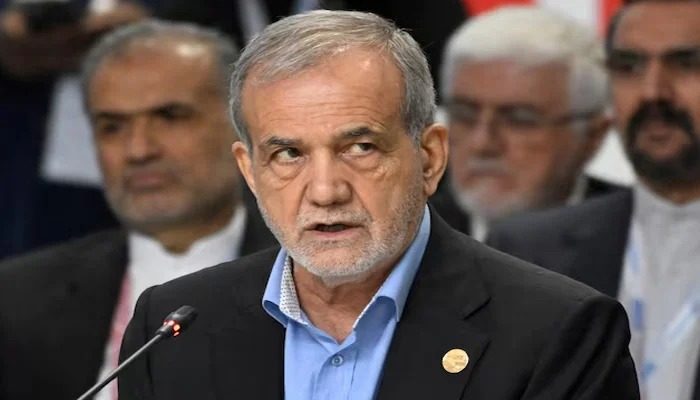Pezeshkian, now more visibly shaping Tehran’s foreign policy rhetoric, delivered his remarks with a defiant tone steeped in Iran’s enduring resistance narrative

News Desk
TEHRAN: Iranian President Masoud Pezeshkian has issued a sharp and unflinching response to US President Donald Trump following the latter’s high-profile visits to several Gulf States where he levelled criticism at Tehran. In a pointed statement that underscored Iran’s combative posture, Pezeshkian challenged Trump directly, asking, “What have you come here for? To scare us?”—a rhetorical question that made clear Iran’s refusal to be cowed by what it sees as American posturing.
Pezeshkian, who has recently taken a more visible role in shaping Tehran’s foreign policy rhetoric, delivered his remarks in a tone that was at once defiant and evocative of Iran’s long-standing resistance narrative. “Trump might believe his presence can frighten Iran,” he said, “but for us, dying as martyrs is far more honorable than dying peacefully in bed.”
His words strike a familiar chord in Iranian political discourse, where martyrdom and resistance are deeply woven into the national identity—especially in moments of confrontation with the West. Pezeshkian’s comments appear designed not only to send a message to Washington, but also to galvanize domestic support and reinforce Iran’s stance as a nation that will not submit to external pressure, no matter how formidable.
The exchange comes against the backdrop of renewed geopolitical maneuvering in the Gulf, where American efforts to shore up alliances with regional partners have been viewed in Tehran as part of a broader containment strategy. Trump’s recent tour, which included stops in Saudi Arabia and the United Arab Emirates, was punctuated by criticism of Iran’s regional activities and its nuclear ambitions—remarks that Tehran has condemned as provocations.
While no immediate military escalations have followed, the rhetorical volley between the two leaders serves as a reminder of the ever-present tensions simmering beneath the surface in the Gulf. For Pezeshkian, the timing of his response appears deliberate—a strategic assertion of sovereignty and defiance in the face of American influence being reasserted in Iran’s neighborhood.



